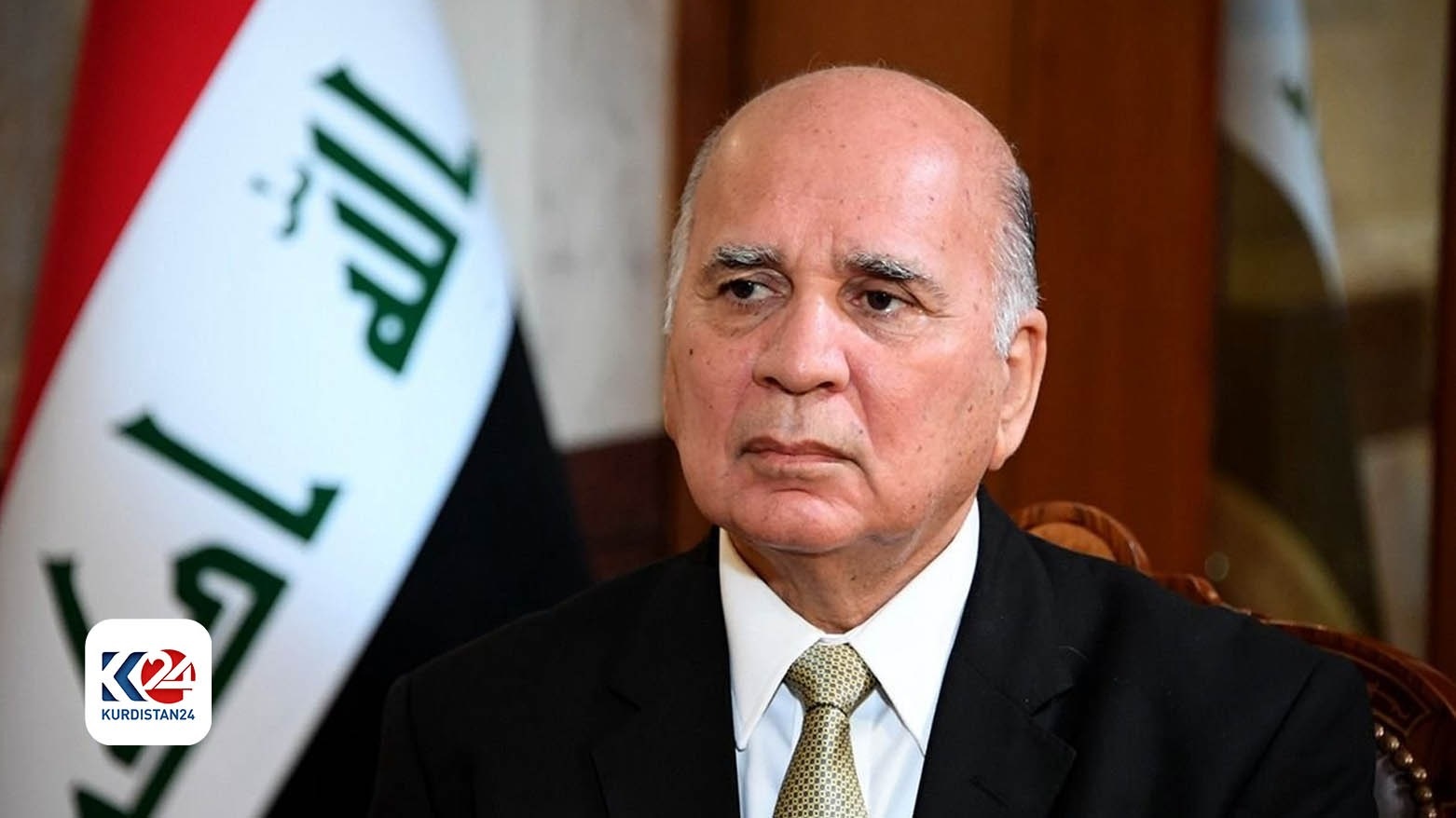Iraqi FM: U.S. Stance on Armed Factions in Iraq is ‘Clear and Consistent’
Iraq's FM states the U.S. warning against Iran-backed armed factions is a "clear and consistent" position, not a new policy. The remarks follow a stark U.S. military warning to Baghdad, escalating pressure ahead of elections.

Erbil (Kurdistan24) – Iraqi Foreign Minister Fuad Hussein affirmed on Friday that the United States’ position regarding armed factions in Iraq is neither new nor ambiguous, stressing that Washington’s warnings to Baghdad have been consistent across successive administrations.
Speaking in a televised interview on Friday, Hussein explained that U.S. warnings concerning armed groups operating in Iraq are not unprecedented, as Washington has repeatedly expressed concern over these factions—particularly those it views as linked to and supported by Iran.
“The U.S. has long accused certain groups of maintaining direct relations with the Iranian government and of being directed and utilized by it,” Hussein stated, noting that this American perception of Iranian-backed militias has remained unchanged for years.
The minister pointed out that while it remains unclear what specific developments prompted the latest U.S. warning, the general American stance toward these groups “is clear and well-known.”
Hussein’s remarks come in the wake of what analysts have described as the strongest U.S. warning yet to Baghdad, following a phone call between U.S. Secretary of War Pete Hegseth and Iraqi Defense Minister Thabet al-Abbasi.
During the call—delivered through the U.S. chargé d’affaires in Baghdad—Hegseth issued a direct and uncompromising warning to the Iraqi government, cautioning against any interference by armed factions in upcoming U.S. military operations “in areas near Iraq.”
According to al-Abbasi, the 11-minute call ended with an ominous final line: “This is your final notice, and you know well how the current administration will respond.”
The message has been widely interpreted as signaling a new phase of confrontation between Washington and Iran-backed militias operating inside Iraq.
Political observers in Baghdad see the latest U.S. communication as an indication that Washington’s strategy has entered a more assertive and punitive stage.
Dr. Ihsan al-Shammari, head of the Iraqi Center for Political Thought, said the warning “marks the end of the testing phase” of the U.S. approach toward armed groups, suggesting that these factions must now either “align with the state and disarm or face possible U.S. military action.”
Security expert Mukhlid Hazem echoed this view, telling Asharq Al-Awsat that “military arrangements are clearly underway in the region, possibly involving coordinated air operations targeting Iranian-backed groups.”
He added that recent diplomatic and military statements—by Secretary Hegseth, Special Envoy Mark Savaya, and Senator Marco Rubio—reflect a unified U.S. campaign to restrict the influence of Tehran-backed militias.
This latest military warning comes amid a broader American campaign combining military, diplomatic, and economic pressure.
Just two days prior to Hegseth’s call, U.S. Special Envoy Mark Savaya declared in his first policy statement that there is “no place for armed groups operating outside the authority of the state,” insisting that Iraq’s stability depends on “unified security forces under a single command.”
Savaya explicitly identified Iran and its proxies as the primary external source undermining Iraqi sovereignty.
Complementing this diplomatic message, the U.S. Treasury Department on October 9 imposed new sanctions on Iraqi financial entities and companies linked to the Islamic Revolutionary Guard Corps (IRGC) and Kata’ib Hezbollah, including the state-owned al-Muhandis General Company, described as the economic arm of the Popular Mobilization Forces (PMF).
Baghdad reacted sharply, with government spokesman Bassem al-Awadi describing the sanctions as “unilateral and unjustified,” warning that such actions “undermine the spirit of partnership” between the two countries.
The escalation comes as Prime Minister Mohammed Shia al-Sudani’s government faces both external and internal pressures on the eve of Iraq’s November 11 parliamentary elections.
Sudani’s ruling coalition, the Shiite Coordination Framework, includes several powerful factions that Washington identifies as Iran-backed militias. The U.S. warnings thus place his administration in a politically delicate position—caught between the expectations of a strategic partner and the influence of armed allies within his own bloc.
According to Iraqi Defense Minister al-Abbasi, Hegseth’s call also covered cooperation on drone operations, a security and intelligence memorandum, and the planned delivery of Bell helicopters to Iraq—highlighting the U.S.’s dual approach of engagement and deterrence.
Analyst Abbas Abboud Salem described this as a “carrot-and-stick strategy”, combining offers of partnership with threats of punitive action, effectively compelling Baghdad to choose between loyalty to its international partner or tolerance toward armed factions.
Foreign Minister Fuad Hussein’s statement reaffirms Baghdad’s recognition that Washington’s stance toward Iraq’s militias remains “clear and consistent.”
But his acknowledgment comes amid the most serious phase of U.S. pressure in recent years—one that could reshape Iraq’s security landscape and test the government’s ability to balance its relations between Washington and Tehran.